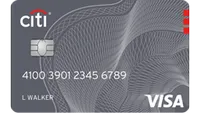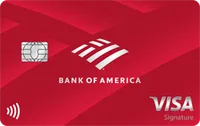Charging an EV? Get Cash Back from Your Credit Card
A Bank of America credit card is the latest to reward charging an electric vehicle — up to 5.25% cash back.


Profit and prosper with the best of Kiplinger's advice on investing, taxes, retirement, personal finance and much more. Delivered daily. Enter your email in the box and click Sign Me Up.
You are now subscribed
Your newsletter sign-up was successful
Want to add more newsletters?

Delivered daily
Kiplinger Today
Profit and prosper with the best of Kiplinger's advice on investing, taxes, retirement, personal finance and much more delivered daily. Smart money moves start here.

Sent five days a week
Kiplinger A Step Ahead
Get practical help to make better financial decisions in your everyday life, from spending to savings on top deals.

Delivered daily
Kiplinger Closing Bell
Get today's biggest financial and investing headlines delivered to your inbox every day the U.S. stock market is open.

Sent twice a week
Kiplinger Adviser Intel
Financial pros across the country share best practices and fresh tactics to preserve and grow your wealth.

Delivered weekly
Kiplinger Tax Tips
Trim your federal and state tax bills with practical tax-planning and tax-cutting strategies.

Sent twice a week
Kiplinger Retirement Tips
Your twice-a-week guide to planning and enjoying a financially secure and richly rewarding retirement

Sent bimonthly.
Kiplinger Adviser Angle
Insights for advisers, wealth managers and other financial professionals.

Sent twice a week
Kiplinger Investing Weekly
Your twice-a-week roundup of promising stocks, funds, companies and industries you should consider, ones you should avoid, and why.

Sent weekly for six weeks
Kiplinger Invest for Retirement
Your step-by-step six-part series on how to invest for retirement, from devising a successful strategy to exactly which investments to choose.
This article only compares credit cards that reward charging an EV. We may get compensation if you visit partner links on our site. We may not cover every available offer. Our relationship with advertisers may impact how an offer is presented on our website. However, our selection of products is made independently of our relationship to advertisers.
Rates checked as of January 18, 2024.
If you frequently charge an EV at a public charging station, your credit card may be able to give you a break on the price. Bank of America will reward Customized Cash Rewards credit cardholders with 3% to 5.25% cash back for charging an EV, the company announced recently.
Bank of America is the latest issuer to reward electric vehicle charging, largely in response to increased customer spending. The bank said EV charging transactions grew by 44% during the first half of 2023.
From just $107.88 $24.99 for Kiplinger Personal Finance
Become a smarter, better informed investor. Subscribe from just $107.88 $24.99, plus get up to 4 Special Issues

Sign up for Kiplinger’s Free Newsletters
Profit and prosper with the best of expert advice on investing, taxes, retirement, personal finance and more - straight to your e-mail.
Profit and prosper with the best of expert advice - straight to your e-mail.
Small business owners that log a lot of miles on electric vehicles may get the most benefit from this cash back category.
Here are some of the best cash back credit cards for public EV charging.
Credit cards for charging an EV
If you’re a member of Sam’s Club, consider this card for the 5% cash back it provides on up to $6,000 spent each year on EV charging or gas. After that, you earn 1% back on charging.
Sam's Club and Walmart plan to install a network of fast chargers across the country, in addition to the almost 1,300 already installed by 2023.
Cash back is redeemable only at Sam's Club stores or at Sam's online site, so be sure you can spend enough at Sam's Club to make the rewards worth it.
Membership: Anyone can be a member of Sam's Club; it costs $50 annually for a Club membership or $110 annually for a Plus membership. Through January 31, 2024, Sam's Club is offering new Club membership at 50% off, for $25.
Interest rate: 20.90% or 28.90% variable APR as of August 1, 2023.
Annual fee: None
Costco Anywhere Visa® Card By Citi
Members of Costco Wholesale can apply for this card, which provides 4% cash back on up to $7,000 per year spent at EV charging and gas stations.
If you want easy access to your cash rewards, this is not the card for you. Cash back is released to cardholders at the end of February each year, and you can lose your rewards if you close your account before February.
These drawbacks likely won't concern loyal Costco customers.
Membership: Anyone can be a Costco member; the cost is $60 annually for a Gold Star membership or $120 annually for an Executive membership.
Interest rate: Variable APR of 20.49% for purchases and balance transfers.
Annual fee: None for Costco members, but see annual membership fees.
Bank of America® Customized Cash Rewards Credit Card
This card offers the most cash back for EV charging — up to 5.25%, but there's a catch. First, after spending $2,500 in a quarter, you will earn only 1% back. Second, you must qualify for the bank's Preferred Rewards® program to get a rate higher than 3% back. Preferred Rewards Members earn 25% to 75% more cash back on each purchase made with the card, depending on their rewards tier. Tiers depend on maintaining a certain combined balance on Bank of America accounts, starting at $20,000. Bank of America's savings account rate is below 0.1%, so you'll likely do better opening a high-yield savings account with a different bank and using one of the other credit cards profiled here.
Cardholders who don't qualify for Preferred Rewards get 3% back on EV charging.
Sign-on bonus: New cardholders get $200 as a statement credit.
Interest rate: 0% for 15 billing cycles for purchases and select balance transfers, then 18.24% - 28.24% variable APR.
Annual fee: None.
U.S. Bank Business Altitude™ Connect World Elite Mastercard®
This card from U.S. Bank is tailored to businesses that rely heavily on travel. It offers 4% cash back on EV charging up to the first $150,000 spent in that category.
You also earn 5% back on hotels and rental cars, and 4% on travel, including airfare and gas, for example. You earn 2% on dining, takeout, restaurant delivery and cell phone services and 1% for all other purchases.
Sign-on bonus: Earn 60,000 points worth $600 if you spend $6,000 on the Account Owner's card in the first 180 days of opening your account.
Interest rate: 20.24% to 28.24% variable APR for purchases and balance transfers.
Annual fee: None the first year, then $95.
Compare with other cash back cards
There's no cut and dried rule to how many credit cards you should have, but it's wise to pause and think through your strategy before you apply for a new card.
If you want to get a break on EV charging costs, have you considered that the cheapest charging method is juicing up at home, especially at night? The Federal EV charger tax credit can knock up to $1,000 off the hardware and installation costs for these chargers.
If you must rely on public chargers, look through your credit card bills to assess how much you spend per month on charging. Most Americans only spend about $56 per month on EV charging, according to Energy Sage. Americans typically spend more on groceries or online purchases per month, which could yield more cash back with a card tailored to those categories. Or you might want to keep it simple and look for a card that provides the best flat rate cash back, such as 2% back on all purchases.
As an independent publication dedicated to helping you make the most of your money, the article above is our view and is not the opinion of any entity mentioned such as a card issuer, hotel, airline, etc. Similarly, the content has not been reviewed or endorsed by any of those entities.
More on Electric Vehicles and Credit Cards
Profit and prosper with the best of Kiplinger's advice on investing, taxes, retirement, personal finance and much more. Delivered daily. Enter your email in the box and click Sign Me Up.

Ellen writes and edits retirement stories. She joined Kiplinger in 2021 as an investment and personal finance writer, focusing on retirement, credit cards and related topics. She worked in the mutual fund industry for 15 years as a manager and sustainability analyst at Calvert Investments. She earned a master’s from U.C. Berkeley in international relations and Latin America and a B.A. from Haverford College.
-
 Quiz: Do You Know How to Avoid the "Medigap Trap?"
Quiz: Do You Know How to Avoid the "Medigap Trap?"Quiz Test your basic knowledge of the "Medigap Trap" in our quick quiz.
-
 5 Top Tax-Efficient Mutual Funds for Smarter Investing
5 Top Tax-Efficient Mutual Funds for Smarter InvestingMutual funds are many things, but "tax-friendly" usually isn't one of them. These are the exceptions.
-
 AI Sparks Existential Crisis for Software Stocks
AI Sparks Existential Crisis for Software StocksThe Kiplinger Letter Fears that SaaS subscription software could be rendered obsolete by artificial intelligence make investors jittery.



